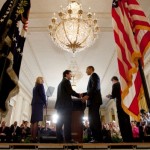Water and People Conference
 On Friday, February 26, 2010, Marquette University Law School (MULS) will hold its annual Public Service Conference at the Alumni Memorial Union on the Marquette University campus on the increasingly important topic of water law. The conference, entitled “Water and People,” will address water issues in Wisconsin (as well as nationally and internationally), development and the environment, regulation, and water ethics. Statewide leaders from business, government, and non-profit served on a steering committee that worked with Assistant Dean for Public Service, Dan Idzikowski, and myself (I coordinate the MULS water law program) to plan the conference. Based on the group’s efforts, experts from Wisconsin, around the United States, and from Canada will gather to talk about some of the most important topics in the field of water law. The conference will also feature a keynote address by Cameron Davis, senior advisor to the United States EPA Administrator for Great Lakes Restoration. You can learn more about the conference and register for the conference at http://law.marquette.edu/cgi-bin/site.pl?2130&pageID=4303.
On Friday, February 26, 2010, Marquette University Law School (MULS) will hold its annual Public Service Conference at the Alumni Memorial Union on the Marquette University campus on the increasingly important topic of water law. The conference, entitled “Water and People,” will address water issues in Wisconsin (as well as nationally and internationally), development and the environment, regulation, and water ethics. Statewide leaders from business, government, and non-profit served on a steering committee that worked with Assistant Dean for Public Service, Dan Idzikowski, and myself (I coordinate the MULS water law program) to plan the conference. Based on the group’s efforts, experts from Wisconsin, around the United States, and from Canada will gather to talk about some of the most important topics in the field of water law. The conference will also feature a keynote address by Cameron Davis, senior advisor to the United States EPA Administrator for Great Lakes Restoration. You can learn more about the conference and register for the conference at http://law.marquette.edu/cgi-bin/site.pl?2130&pageID=4303.
While no blog post can truly capture all that this conference will entail, here is a preview of the panels and topics.

